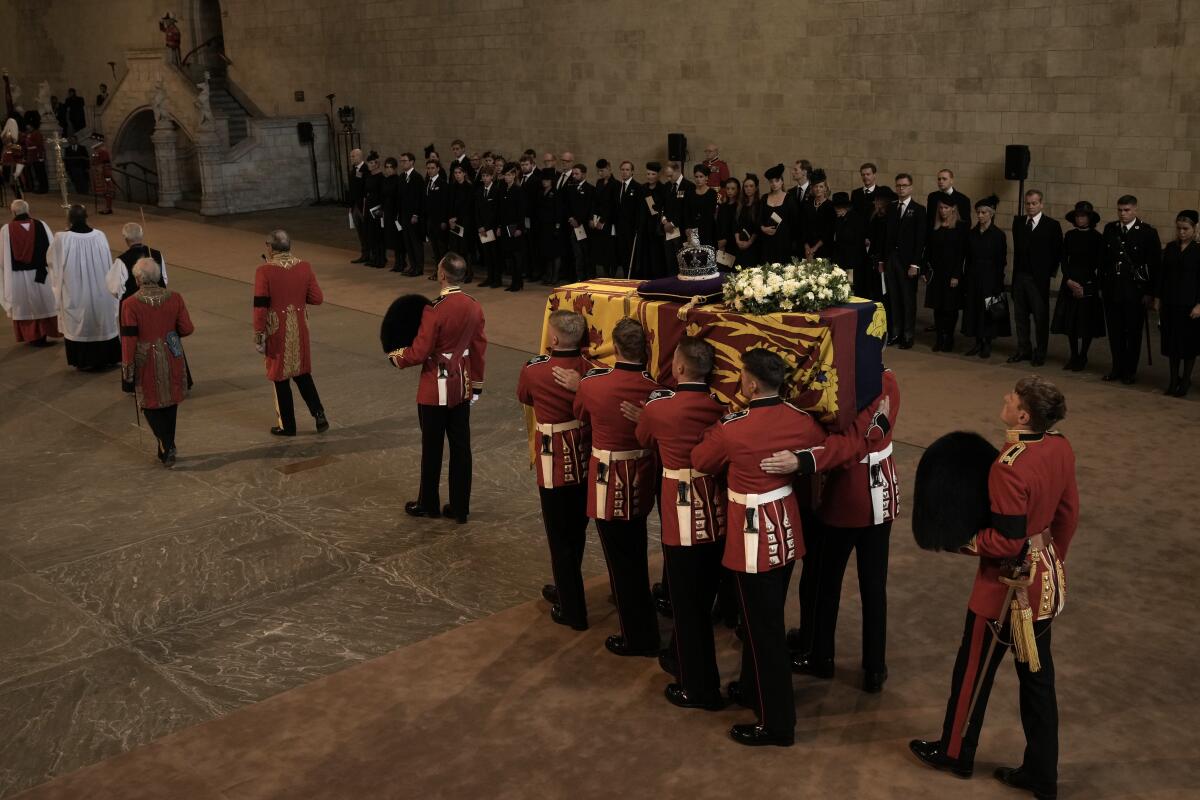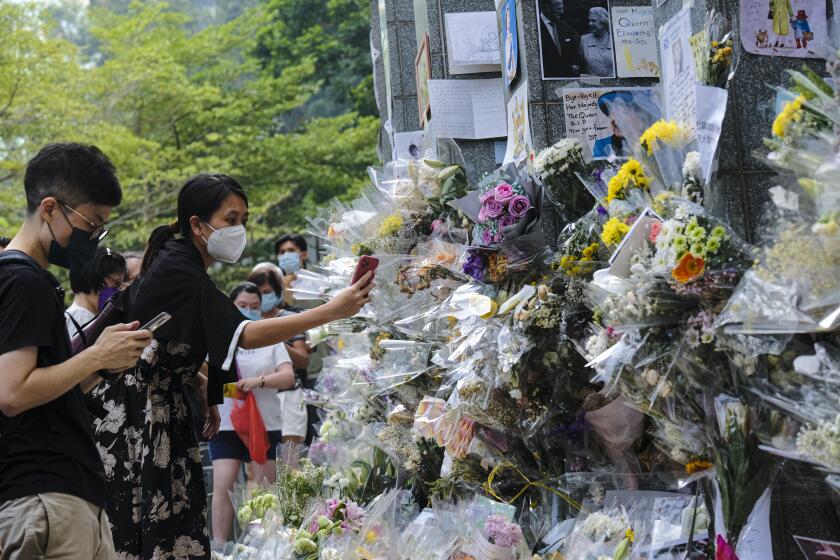Invitation list spurs awkward diplomatic dance ahead of queen’s funeral

- Share via
LONDON — Ever get an invitation to an event and wonder who didn’t make the cut? Or how close you’re sitting to the host? Or who else is at your table?
In recent days, hundreds of presidents, prime ministers, kings, queens, emirs and other world dignitaries invited to Queen Elizabeth II’s funeral — set for Monday — have been pondering similar questions, reading protocol arrangements like they would tea leaves amid speculation over who has been asked to attend the most significant diplomatic event held by the United Kingdom in recent years.
Though the official guest list has not been published, the expectation is that Westminster Abbey, where the funeral will take place and which can hold 2,000 people, will be filled to capacity. Leaks of documents from the U.K.’s Foreign, Commonwealth and Development Office (FCDO) related to funeral arrangements show the government exhorting visiting leaders to limit their numbers of delegates and consider flying commercial in a bid to reduce congestion at Heathrow.
But it’s another requirement that has raised diplomatic ire: that dignitaries ditch their private cars at a rallying point near the abbey and make their way en masse by bus — an idea so controversial, it would seem, that the British prime minister’s official spokesman Monday insisted that arrangements for leaders would “vary depending on individual circumstances” and that the information provided was “guidance.”
In former British colony of Hong Kong, death of Queen Elizabeth II prompts nostalgia for days before Beijing’s rule took an authoritarian turn.
Word of exceptions granted to certain leaders — such as President Biden, who accepted the invitation early on and will go to the abbey in his armored Cadillac stretch known as “The Beast,” — have reportedly left diplomats scrambling to get the same treatment for their bosses, or at least clarity on who will be seated next to them in the coach.
Meanwhile, the question of who is invited (or not) and who will be going (or not) has brought its own raft of issues.
So far, European royal figures from Belgium, Denmark, Monaco, the Netherlands, Norway, Spain and Sweden have confirmed attendance. So too have all the heads of the Commonwealth countries, including Canadian Prime Minister Justin Trudeau, Indian President Droupadi Murmu and South African President Cyril Ramaphosa. President of the European Commission Ursula von der Leyen said she will attend as has Ukraine’s First Lady Olena Zelenska; due to join them are the presidents of Austria, Finland, Germany, Hungary, Ireland, Italy and Poland. On Wednesday, French President Emmanuel Macron tweeted from his official account that he would be present too.
From farther afield, Japanese Emperor Naruhito and Empress Masako, in a break from standard protocol, will attend the funeral, as a measure of the close ties he and his family enjoyed with the late monarch. Some strange bedfellows are due to be in attendance: Turkish President Recep Tayyip Erdogan, Emir of Qatar Sheikh Tamim bin Hamad Al Thani, Israel’s President Isaac Herzog, Palestinian Prime Minister Mohammad Shtayyeh, Jordan’s King Abdullah II, Emirates head Sheikh Mohammed bin Zayed.
Brazil’s Jair Bolsonaro and South Korean President Yoon Suk-yeol are also among the expected attendees.
Mexico will dispatch Foreign Affairs Secretary Marcelo Ebrard. And in a move hinting at the tepid relationship with the U.K., Iran, North Korean and Nicaragua have been invited to send representatives only at the ambassadorial level.
Only six countries are not on the guest list in any capacity: Russia, as a result of its invasion of Ukraine, and Belarus for facilitating the attack; Afghanistan, now under Taliban rule; Myanmar, where the military took control in a coup last year; Syria, with which there have been no diplomatic relations because of the ongoing civil war; and Venezuela, which also has no diplomatic relations with the United Kingdom.
One particularly large hiccup occurred with China when on Thursday a group of British parliamentarians heard of the invite extended to Chinese President Xi Jinping and called for it to be rescinded, describing it in a letter to the Parliament head as “wholly inappropriate.”
The animus there centers on the U.K. government’s imposition of sanctions on Chinese officials it deemed responsible for genocide against the Uyghurs, China’s Muslim minority. Beijing imposed its own travel bans and asset freezes a few days later on British officials, including the parliamentarians who wrote the letter. Parliament retaliated by barring China’s ambassador to the U.K. from entering Parliament. In April, it also voted to recognize as genocide Beijing’s treatment of Uyghurs in the territory of Xinjiang.
Despite the kerfuffle, Chinese Vice President Wang Qishan has confirmed he will attend, according to the Chinese foreign ministry. Still, some of the MPs, in statements to the British press, said they were given assurances by parliamentary leaders that a Chinese delegation would not be allowed to go to Westminster Hall to view the queen’s lying-in-state, where tens of thousands of people have queued for more than 24 hours since Thursday for a chance to pay their respects.
But in an apparent volte-face, a parliamentary spokesperson Saturday said to reporters that “the head of state (or their representatives) who have been invited to attend the state funeral in Westminster Abbey are also invited to attend the lying-in-state in Westminster Hall.”
Further controversy was kicked up around Saudi Crown Prince Mohammed bin Salman, who Saudi official authorities said will hold a phone call with the U.K.’s newly minted Prime Minister Liz Truss on Saturday evening. The crown prince was determined in a declassified CIA report to have ordered the killing of Saudi journalist Jamal Khashoggi, whose corpse was then dismembered inside the Saudi Consulate in the Turkish capital Istanbul in 2018.
The crown prince denied having anything to do with the murder; since then, he has worked to rehabilitate his image internationally; if he were to attend the funeral, it would be his first trip to London since 2018.
Saudi Arabia remains an important customer for British arms companies and employs thousands of expatriate workers. During his decades as prince, King Charles III visited Saudi Arabia more than 10 times; last year his personal aide resigned when press reports revealed the aide had promised to bestow a knighthood upon a Saudi businessman in exchange for donating to the then-prince’s charities. The businessman, Mahfouz Marei Mubarak bin Mahfouz, was awarded a Commander of the British Empire medal by then-Prince Charles in a private ceremony in 2016; the Metropolitan Police launched an investigation earlier this year. The king denied having any knowledge of the promises made to Mahfouz.
Though there is still no official confirmation, CNN Arabic quoted a source close to the Saudi royal family who said the crown prince would touch down in the English capital Sunday. It remains unclear if he will attend the funeral itself or have an opportunity to give his condolences to the royal family privately. But the prospect of his coming has infuriated several rights groups, as well as Hatice Cengiz, Khashoggi’s fiancee, who condemned the invitation.
“The Queen’s passing is a truly sad occasion. The crown prince should not be allowed to be part of this mourning and not be allowed to stain her memory and use this time mourning to seek legitimacy and normalisation,” Cengiz said in an interview with the Guardian newspaper. She instead called on U.K. authorities to arrest him when he lands in London, but said she had little hope they would do so.
Pressure group Campaign Against the Arms Trade (CAAT) also excoriated the U.K. government for inviting Saudi Arabia and said it would hold protests in front of the embassies of Saudi Arabia and Bahrain; both countries are significant importers of British arms.
“Mohammad bin Salman is at the head of a murderous regime,” said Katie Fallon, CAAT parliamentary coordinator, in a statement. “These despots are using the Queen’s state funeral as an opportunity to whitewash their reputations.”
More to Read
Sign up for Essential California
The most important California stories and recommendations in your inbox every morning.
You may occasionally receive promotional content from the Los Angeles Times.















